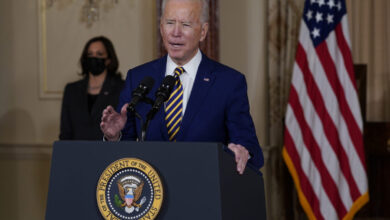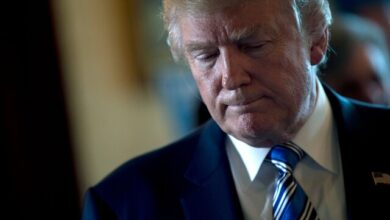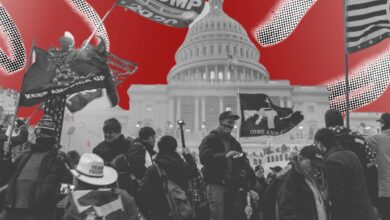Crack-Up Capitalism: How Elon Musk’s Influence and Extremist Views Are Shaping the Trump Administration and Global Politics
Billionaire Trump associate Elon Musk’s latest disinformation campaign is now targeting the U.K. government, which Musk appears to believe is insufficiently anti-immigrant. Musk, who has already influenced the incoming Trump administration’s economic policy by proposing substantial cuts to government spending and advocating for privatization of tech-driven services, is being hailed as a symbol of a “new era” in American politics. According to historian Quinn Slobodian, who studies the growing influence of right-wing tech billionaires, Musk embodies an ideology that blends “destructive” and “nihilist” beliefs, aiming to reshape the world in his image. In a wide-ranging conversation, Slobodian delves into Musk’s admiration for authoritarian strongmen, his endorsement of market deregulation, and his embrace of white supremacist rhetoric.
Early this morning, Musk posted a poll on his X platform (formerly Twitter) asking, “America should liberate the people of Britain from their tyrannical government — Yes or No?” The provocative question was part of a flurry of misinformation-laden posts that have drawn scrutiny. The New York Times reported that Musk, “appears intent on exercising the same influence in European countries that he did during the American presidential election.”
In recent days, Musk has launched a series of attacks on the U.K.’s Labour government, and even criticized Nigel Farage, a politician he once supported. Farage, leader of the far-right Reform UK party, fell out of Musk’s favor after refusing to back the release of imprisoned far-right activist Tommy Robinson, who is known for his anti-immigrant, Islamophobic views. Musk has also made false claims about U.K. Prime Minister Keir Starmer, accusing him of failing to prosecute child rapists. Furthermore, Musk amplified a post on X suggesting that King Charles should dissolve the British Parliament and call for elections to remove the Labour government.
This controversy follows Musk’s endorsement of Germany’s far-right AfD party ahead of upcoming elections. He plans to host a live discussion on X with the party’s candidate for chancellor. German Chancellor Olaf Scholz dismissed Musk’s involvement, stating, “I don’t believe in courting Mr. Musk’s favor. I’m happy to leave that to others. The rule is: don’t feed the troll.”
Meanwhile, in the United States, Musk has solidified his influence over the incoming Trump administration. The billionaire donated more than $250 million to Trump’s campaign and has reportedly earned over $200 billion since Trump’s election victory. Musk attended a New Year’s Eve gala at Mar-a-Lago alongside Trump and has participated in several calls with foreign leaders. Additionally, Musk has been appointed co-head of Trump’s proposed Department of Government Efficiency, or DOGE. He played a key role in persuading Republican lawmakers to reject a last-minute government spending deal, and he secured Trump’s support for H-1B visas for skilled workers, a position at odds with Trump’s anti-immigrant base.
On the media front, Pulitzer Prize-winning cartoonist Ann Telnaes recently resigned from The Washington Post after the paper’s editors rejected her cartoon criticizing tech billionaires for their allegiance to Trump. Telnaes, who has been with the Post since 2008, published a farewell post titled “Why I’m quitting the Washington Post,” stating, “I will not stop holding truth to power through my cartooning, because as they say, ‘Democracy dies in darkness.’” This incident occurred as Amazon—owned by fellow billionaire Jeff Bezos—announced its exclusive documentary on Melania Trump and pledged $2 million in donations to Trump’s inauguration fund.
To unpack the implications of Musk’s global influence, Democracy Now! interviewed Quinn Slobodian, a professor of international history at Boston University. Slobodian, whose latest book is Crack-Up Capitalism: Market Radicals and the Dream of a World Without Democracy, has been documenting Musk’s rise as a political force. In the interview, he describes Musk as a “scaled-up version of Steve Bannon,” capable of creating a transatlantic coalition of far-right actors while wielding unprecedented economic and technological power.
“Musk has entered this field of politics as a kind of scaled-up version of his video game play, with no real thought to the consequences of the disruptive effects he’s creating,” Slobodian said. Musk’s growing alliances with figures like Nigel Farage, Tommy Robinson, and Germany’s AfD illustrate his willingness to destabilize traditional political systems and embrace disruption for its own sake.
Slobodian notes that Musk’s fascination with authoritarianism is not limited to Europe. Recently, Musk praised El Salvador’s President Nayib Bukele for his draconian crime policies, which include imprisoning 2% of the country’s adult population. Musk has celebrated this model as something that should be replicated in the U.S. His vision combines a strong authoritarian state with extreme market deregulation, a philosophy rooted in Thatcherism but amplified by internet culture and meme-driven politics.
Musk’s demographic fears also play a significant role in his politics. In a recent article for The New Statesman, Slobodian explores Musk’s obsession with declining birth rates. Musk’s pronatalism, however, is selective, emphasizing the preservation of particular European cultures over others. He has endorsed the “great replacement” theory, which posits that liberal politicians are intentionally replacing white populations with nonwhite immigrants to gain political power. This ideology has fueled Musk’s recent hard-right turn, marked by inflammatory posts about immigrants, often portraying them as criminals or welfare dependents.
Slobodian connects Musk’s worldview to his upbringing in apartheid South Africa. Musk’s experiences growing up in a society structured around racial segregation and systemic oppression have shaped his worldview, Slobodian argues. “He saw it as a kind of social Darwinist, all-against-all environment,” Slobodian said, drawing parallels between Musk’s formative years and his current embrace of a dystopian, survivalist ethos.
Musk’s embrace of alt-right symbols, such as Pepe the Frog, classified as a hate symbol by anti-hate organizations, and his promotion of conspiracy theories, further illustrate his alignment with fringe ideologies. However, Slobodian cautions against focusing too much on Musk’s surface-level provocations. Instead, he emphasizes the real-world consequences of Musk’s political and economic interventions, from boosting far-right parties in Europe to shaping policy in the U.S.
As Musk continues to amass influence, his ability to disrupt political norms and shape global narratives poses significant challenges. Whether through his control of social media platforms, his dominance in industries like automotive and aerospace, or his growing political alliances, Musk’s impact on the global stage is both unprecedented and deeply troubling.




